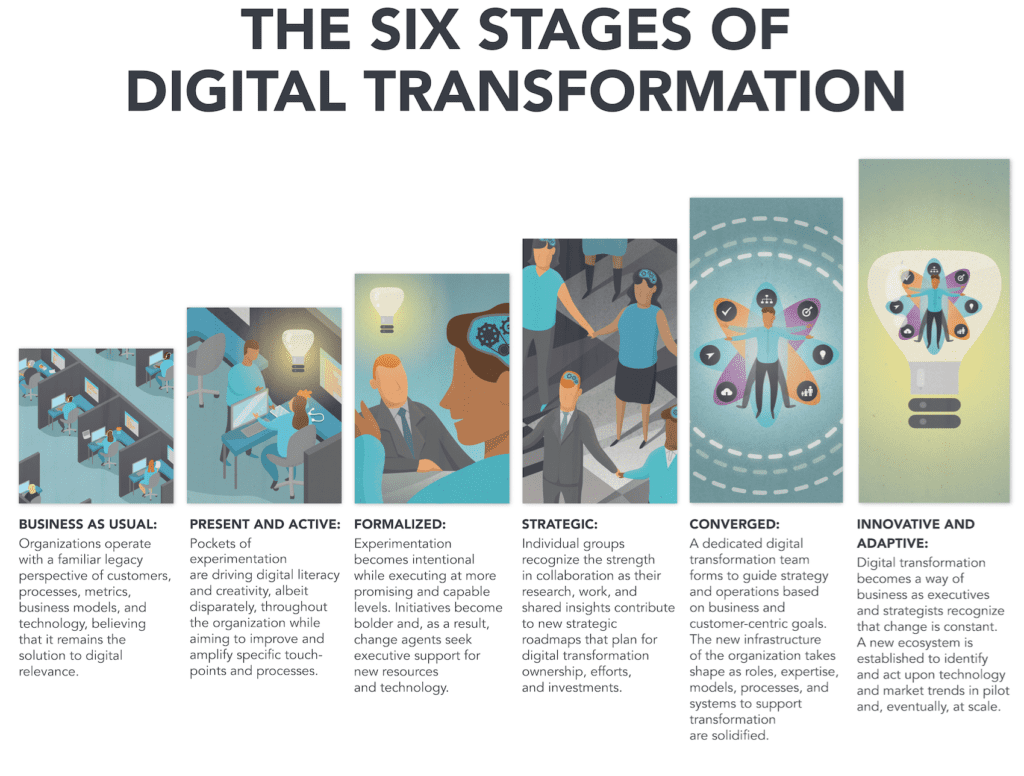Digital transformation is a key factor for the success of organizations and businesses in the era of the 4.0 digital revolution. It involves applying the latest digital technologies to all aspects of their operations, to enhance their performance and increase their revenue and brand recognition.
Digital transformation is not just a matter of switching from traditional manual work (such as writing in notebooks, meeting face-to-face, etc.) to using technology to save human effort. Digital transformation is a change in business mindset, operational methods, and organizational culture.
For businesses, digital transformation means embedding digital solutions into the core of their activities, changing the way they work fundamentally by creating new business processes, customer experiences and organizational cultures. It does not only improve existing methods but also invents new ones to meet the evolving market demands.
Distinguish between digital transformation and digitization
Digital transformation and digitization are often used interchangeably, but they have different meanings and implications for organizations. Here is how to differentiate them:
Digitization is the process of converting analog information, such as paper documents, CDs, hard drives, etc., into digital formats that can be stored and accessed online. This makes data more searchable and usable for daily work.
Digital transformation is the process of rethinking and redesigning traditional business and operational models to leverage digital technologies and capabilities. Managers need to adopt a digital mindset and culture to maximize the value that technology can deliver to their businesses.

Meaning of digital transformation in business
Digital transformation is very important for the development of businesses and organizations. It gives organizations the opportunity to unlock more potential by allowing them to scale effectively, improve business performance, reach customers easily and at optimal costs.
Some benefits that digital transformation brings to businesses:
Provide insights from data: Digital transformation helps personnel in businesses have access to huge amounts of data. They can track all kinds of metrics, like process efficiency, channel conversion rates, customer lifetime value, customer satisfaction, and more. Not only does it allow businesses to organize their data in an intuitive and easily accessible way, but it also enables data-driven decision making. This allows managers to make more accurate, faster decisions.
Maintain business competitiveness: Digital Transformation has become a vital issue in the constantly developing industrial 4.0 era. It is not a matter of choice, but of necessity to remain competitive. Businesses must choose the right technology to meet their digital transformation goals and satisfy customers. Digital transformation tools 4.0 are built to meet modern customer needs, and companies need to find the right solutions to enhance the experience and meet current and future customer requirements. hybrid.
Enhance customer experience: Customers demand personalization and it cannot be achieved at scale without using digital. Digital technology can give you insights into your customers’ historical data, including their interactions, preferences, and engagement levels. Furthermore, they provide the means to quickly analyze this data to personalize the customer experience to better meet customer needs and expectations.
Strengthen links between departments: Digital Transformation allows personnel between departments throughout the company to communicate better and more frequently. Thanks to the use of automated business management platforms, departments can easily share all types of information and documents easily anywhere, anytime. This helps improve collaboration.
Improve operational efficiency and reduce costs: Digital technology helps businesses save maximum costs for their operations. For example, virtual reality allows employees to test and review new processes or products without having to build them first, as it’s all represented visually on digital images. Meanwhile, the problem of data storage can be solved by cloud computing and can be managed by external providers. This helps business employees have more time to focus on other projects and work that bring more business value and worry less about data storage.
In general, Digital Transformation enables businesses to streamline tasks and processes that used to be manual and time-consuming, such as: gathering customer information, managing finances, administering work, handling human resources, generating reports, etc. By using digital tools and technologies, businesses can improve their efficiency, productivity, and customer satisfaction.

